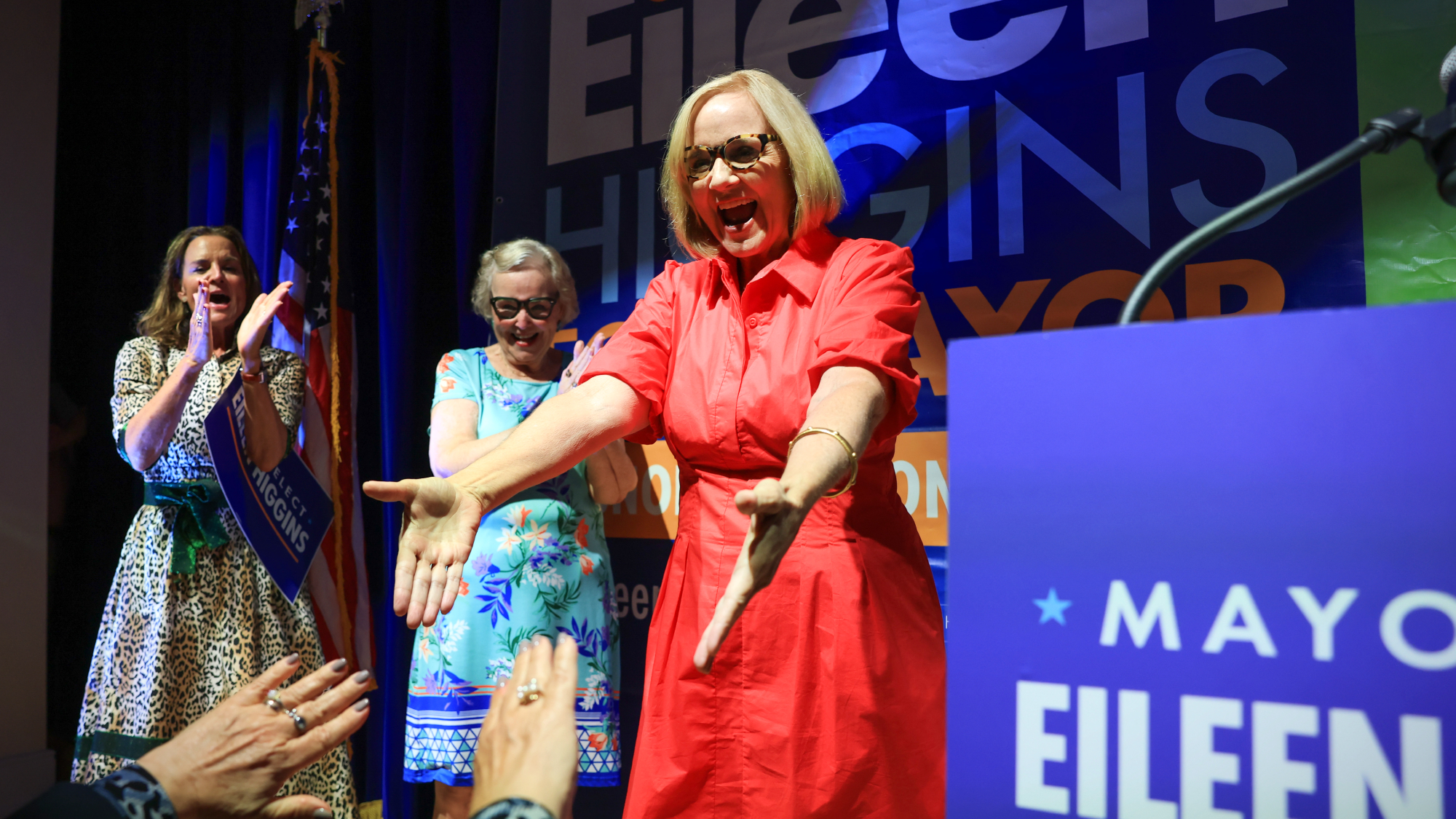The 'anti-woke' agenda is going to cost taxpayers big bucks
Ron DeSantis' grudge against Disney might be good politics, but it's bad for Florida


A free daily email with the biggest news stories of the day – and the best features from TheWeek.com
You are now subscribed
Your newsletter sign-up was successful
Anti-woke politics might be great for rallying GOP voters, but it also makes for lousy governance.
Take Florida, please. Republican Gov. Ron DeSantis on Friday signed a bill that revokes a special tax district which essentially gave Disney governing powers on its theme park land at Orlando. Whatever you think about that longstanding arrangement — or corporate power in general — the new law was plainly an act of revenge, a thuggish (and probably unconstitutional) bit of Republican retaliation for Disney's belated opposition to the controversial "Don't Say Gay" law approved just a few weeks earlier by the state's GOP-led legislature.
So much for the First Amendment rights of businesses.
The Week
Escape your echo chamber. Get the facts behind the news, plus analysis from multiple perspectives.

Sign up for The Week's Free Newsletters
From our morning news briefing to a weekly Good News Newsletter, get the best of The Week delivered directly to your inbox.
From our morning news briefing to a weekly Good News Newsletter, get the best of The Week delivered directly to your inbox.
"You're a corporation based in Burbank, California, and you're gonna marshal your economic might to attack the parents of my state," DeSantis said before signing the anti-Disney law. "We view that as a provocation, and we're going to fight back against that."
Here's the not-so-funny part: The state government's commitment to "fighting back" probably means hurting Florida taxpayers. It's a complicated story, but the gist of it is that revoking Disney's tax district essentially puts area residents on the hook for more than $1 billion in bonds the company used to pay for things like water service and new roads on its land. Local homeowners could see their taxes jump by 20 percent as a result.
Oops.
Or maybe not. The new law undoing Disney's tax district doesn't actually take effect until June 2023, and observers think the company and the state might work out some kind of accommodation by then. The whole incident might end up as little more than a showy, performative in-kind contribution from the Florida Legislature to DeSantis' incipient 2024 presidential campaign.
A free daily email with the biggest news stories of the day – and the best features from TheWeek.com
Still, a question is raised. Can states and their citizens thrive when their Republican leaders are dedicated to little more than owning the libs, Donald Trump-style?
Maybe not. Florida isn't the only example. In Texas, Gov. Greg Abbott earlier this month locked up his state's border with Mexico with "secondary inspection" of trucks entering the country — ostensibly to halt the flow of drugs and migrants, but probably also to try to embarrass President Biden on immigration. (Abbott also bused unwanted migrants to the steps of the U.S. Capitol, an obvious stunt.) The inspections halted traffic, bogged down the flow of goods in an economy still facing pandemic-era supply chain snarls, and reportedly cost Texas more than $4 billion in economic activity. Also: No migrants or drugs were found. The whole thing was a bust.
Abbott got to make his point, theatrically. The people of Texas paid for it.
Anti-woke, anti-Democratic governance has dominated the agendas of Republican-led state governments in recent months. Several have come up with bills that let parents sue teachers and schools for teaching "critical race theory" or — like Florida — mentioning anything related to gender identity in the classroom, for stocking books on those topics in school libraries, or for any reason at all. Texas and Florida have also taken steps to limit tenure protections for "Marxist" professors at public universities — however many of those are left.
Public universities aren't just places where students party for four years before moving on to real life — they're engines of research and economic growth for their states. One 2019 report suggested that technology created at the University of Florida alone generated $2.4 billion and 10,000 jobs for the state's economy. And K-12 schools are important for making citizens, but also workers: They're where most Americans learn the basic skills they'll use in their offices, factories, and other workplaces over the course of their lifetimes. Will teachers and professors want to work in red states if they have to constantly be worried about lawsuits and job security? And what would it mean for those states' economies if they don't? Will corporations want to do business in states where government leaders will bully them for having bad politics?
Not so long ago, Republicans used the culture wars to distract voters away from their unpopular economic agenda of making the rich richer at just about everybody else's expense. These days, the culture wars seem to be the entire point. But it's not clear that the GOP's anti-woke governing agenda will actually make red states better places for their residents to live and prosper. And it's not clear that Republican politicians like Ron DeSantis actually care.
Joel Mathis is a writer with 30 years of newspaper and online journalism experience. His work also regularly appears in National Geographic and The Kansas City Star. His awards include best online commentary at the Online News Association and (twice) at the City and Regional Magazine Association.
-
 What to know before filing your own taxes for the first time
What to know before filing your own taxes for the first timethe explainer Tackle this financial milestone with confidence
-
 The biggest box office flops of the 21st century
The biggest box office flops of the 21st centuryin depth Unnecessary remakes and turgid, expensive CGI-fests highlight this list of these most notorious box-office losers
-
 What are the best investments for beginners?
What are the best investments for beginners?The Explainer Stocks and ETFs and bonds, oh my
-
 The billionaires’ wealth tax: a catastrophe for California?
The billionaires’ wealth tax: a catastrophe for California?Talking Point Peter Thiel and Larry Page preparing to change state residency
-
 What have Trump’s Mar-a-Lago summits achieved?
What have Trump’s Mar-a-Lago summits achieved?Today’s big question Zelenskyy and Netanyahu meet the president in his Palm Beach ‘Winter White House’
-
 Bari Weiss’ ‘60 Minutes’ scandal is about more than one report
Bari Weiss’ ‘60 Minutes’ scandal is about more than one reportIN THE SPOTLIGHT By blocking an approved segment on a controversial prison holding US deportees in El Salvador, the editor-in-chief of CBS News has become the main story
-
 Miami elects first Democratic mayor in 28 years
Miami elects first Democratic mayor in 28 yearsSpeed Read Eileen Higgins, Miami’s first woman mayor, focused on affordability and Trump’s immigration crackdown in her campaign
-
 Has Zohran Mamdani shown the Democrats how to win again?
Has Zohran Mamdani shown the Democrats how to win again?Today’s Big Question New York City mayoral election touted as victory for left-wing populists but moderate centrist wins elsewhere present more complex path for Democratic Party
-
 Millions turn out for anti-Trump ‘No Kings’ rallies
Millions turn out for anti-Trump ‘No Kings’ ralliesSpeed Read An estimated 7 million people participated, 2 million more than at the first ‘No Kings’ protest in June
-
 Miami Freedom Tower’s MAGA library squeeze
Miami Freedom Tower’s MAGA library squeezeTHE EXPLAINER Plans to place Donald Trump’s presidential library next to an iconic symbol of Florida’s Cuban immigrant community has South Florida divided
-
 Florida wages crosswalk war on public displays of pride
Florida wages crosswalk war on public displays of prideIN THE SPOTLIGHT Gov. Ron DeSantis' campaign comes for colorful crosswalks, as Florida residents engage in guerrilla graffiti as a form of resistance
